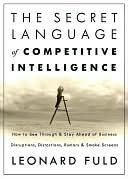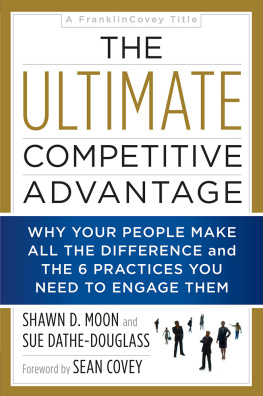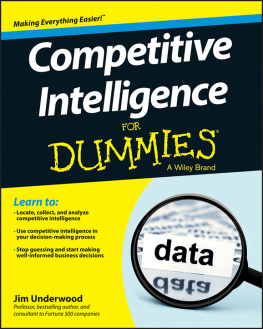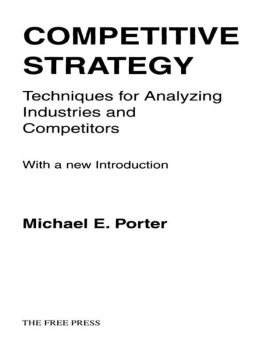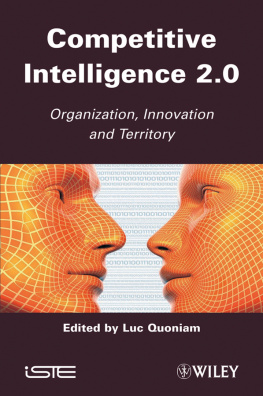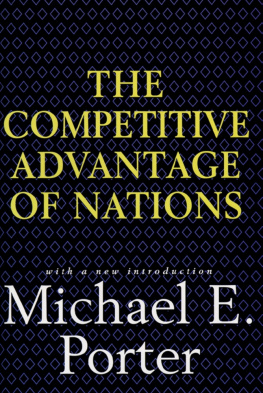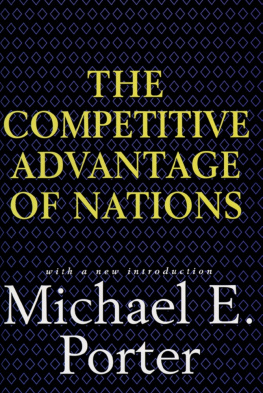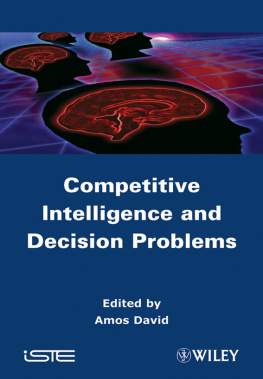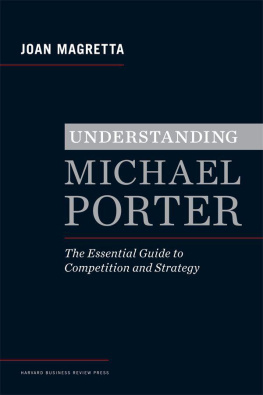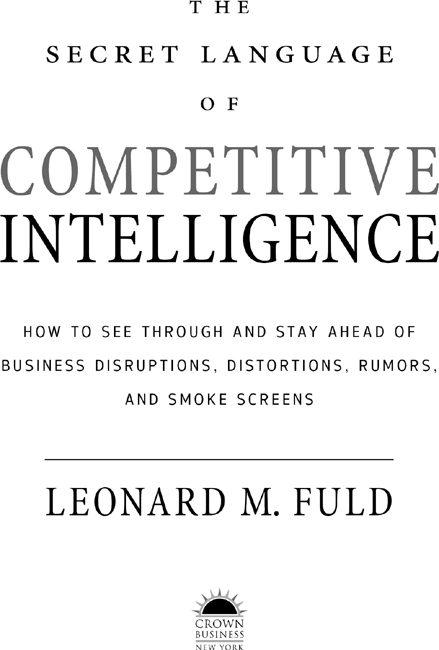To Bert and Inge Fuld,
Stanley and Doris Domb,
my love and thanks
CONTENTS

DISRUPTIONS, DISTORTIONS, RUMORS, AND SMOKE SCREENS
Just Another Day in the Office
The secret language of competitive intelligence is based on two building blocks. The first is the ability to find the right competitive information. The second, and most critical, is the ability to see past market disruptions and dispassionately interpret events. While I have spent nearly my entire professional life assessing and writing about competitive intelligence, I came to realize recently that it was also a major part of my fathers unusual introduction to America as a new immigrant. His experience has helped me appreciate anew the framework for this book.
Along with my grandparents and his brother, my father fled Germany in 1937, barely escaping with his life. Five years later, at age eighteen, he was drafted into the United States Army, thick German accent and all.
In 1943, after my father completed basic training, an officer assigned to the armys counterintelligence group determined that this recent refugee dressed in army fatigues, with his knowledge of Germany, its culture and language, was an asset the military could use. Dad was told to pack his bags and join hundreds of other German-speaking immigrant GIs at Camp Ritchie in Maryland, a training center for psychological warfare.
Hidden away in the Maryland hills, Camp Ritchie was designed to turn my father and other young immigrants into expert interrogators and interpreters. Ritchies intelligence officers taught my father to read maps, memorize the Order of Battle (literally a family tree of the German command structure), understand basic cryptography, and apply methods of interrogation and translation. Toward the end of his tour of duty as a Camp Ritchie graduate, he served as a document translator for the Nuremberg trials immediately following the war.
Lots of soldiers in World War II learned how to read maps and conduct interrogations. Some had even learned German in school. German was not a secret language (except for those who could not speak German). The advantage those in Camp Ritchie had over American speakers of German was a depth of experience about Germany and its culture that allowed for interpretation. What made my fathers experience different, what made the Camp Ritchie crew so effective, was the ability to apply culture and language to peer into the enemys mind and ultimately to interpret key messages.
As an example, my father tells this story: Immediately following the war, I was sent to Cologne, Germany, as part of the militarys counterintelligence group. There I interrogated a captured German soldier who claimed that he was from Hessen [a province in Germany], the same part of Germany where I grew up.
I could tell instantly from his dialect that he was not from Hessen. It would be as if someone with a deep Southern accent in the United States claimed he was from New York or Detroit. He spoke in a way that told me he was from somewhere else altogether in Germany. I passed this information on to my officers, who interrogated him further and discovered that he was an SS officer who was attempting to escape notice.
This seemingly minor incident speaks volumes about how you develop useful intelligence. It demonstrates the importance of observation and how the appreciation of even the tiniest subtlety, such as detecting a dialect that was out of place, can yield great insight.
My fathers very foreignness gave him an intelligence advantage over the many other American-born soldiers and officers at the camp, some of whom were attorneys or other highly educated professionals. Unfortunately, education alone could not unlock the information the army needed. Being able to stand outside their own culturein this case the enemys culturemade the Camp Ritchie graduates a priceless asset. Foreignness can be a gift in intelligence.
The interpretation and implication lessons in army intelligence my father and the U.S. military collaborated on more than half a century ago are similar in striking ways to those you will find in many of this books business cases. You will discover, among other aspects of competitive intelligence, that being an outsider can be turned into an asset when it comes to analyzing critical competitive moves. Call these the Camp Ritchie Rules.
The simplicity of the Camp Ritchie Rules has helped me dispel any number of misconceptions managers hold about competitive intelligencefor example, that it is impossible to develop deep insights on a rival without committing an illegal act. Or that publicly available information limits you to what you can find in an annual report or a Wall Street analysts newsletter. Or that private companies or subsidiaries are just beyond our intelligence reach. These notions are all wrong, as this books cases clearly prove.
Competitive intelligenceanalyzed information that gives you insight and competitive advantageis a discipline that can be taught. You and everyone else in your company, from salespeople to research scientists, can apply this discipline to improve market standing and bottom-line results.
This isnt to say that the discipline is simple and easy to learn. The biggest challenge most managers face is that they are surrounded by smoke screens, rumors, and competitive distortions. Competitors create smoke screens all the timeand the marketplace helps them out with a glut of information and misinformation. Rumors (sometimes intentionally, sometimes unintentionally placed) course through markets, prompting managers to react inappropriately or to ignore danger signs altogether.
You need to see through these smoke screensnot wait them out. If you wait until the smoke clears, you may have delayed too long. You may find that your opportunity has disappeared or the threat solidified. Either way, you lose. You need to see ahead of your competition and spot a major disruption long before it lands on your doorstep.
One thing is for certain: Competitive intelligence is both every The news stories covered the need for intelligence from North America, Latin America, Europe, and throughout the Asia/Pacific region and in nearly every area of business, from R&D to sales to marketing to operations to communications.
The growth of the Society of Competitive Intelligence Professionals, based in Alexandria, Virginia, from a handful of members in 1986 to thousands today from around the globe, is another indication of the concepts acceptance within most large corporations. Yet this growth begs a question: How can even a few thousand intelligence professionals hope to meet the intelligence needs that emanate from everywhere in the corporation? As I have suggested, they cant and they shouldnt.
Competitive intelligence, as a means to see through and ahead of fast-changing rivals, has become a critical component in the business arsenal. It should be part of everyones job. At the same time, intelligence itself has evolved into something much less neat, clean, and easy to manage. It has become more sophisticated and, for those who take full advantage of it, an ever more powerful weapon.
You must realize that there are new realities in todays competitive intelligence world. I have identified five you will need to appreciate and apply.
REALITY 1: INTELLIGENCE IS AN ART FORM
More than ever, effectively seeing through or ahead of the competition is an art form (as opposed to a totally rational and structured technique), but one that is very accessible to those willing to learn its tools, techniques, and concepts. Theres a creative aspect to taking gobs of loose data and making sense out of them. Data on the competition does not come in nice, bow-wrapped, hexadecimal packages that you can digest by spreadsheet, regression analysis, or even a well-written memo. It may appear in the form of a picture, an observation of the active crowd huddled around a trade show booth, the pregnant pause of a speaker on the podium in reaction to a tough question. The observer is the artist here. He or she needs to catch the important clues, piece this image together, and create the precious intelligence.

